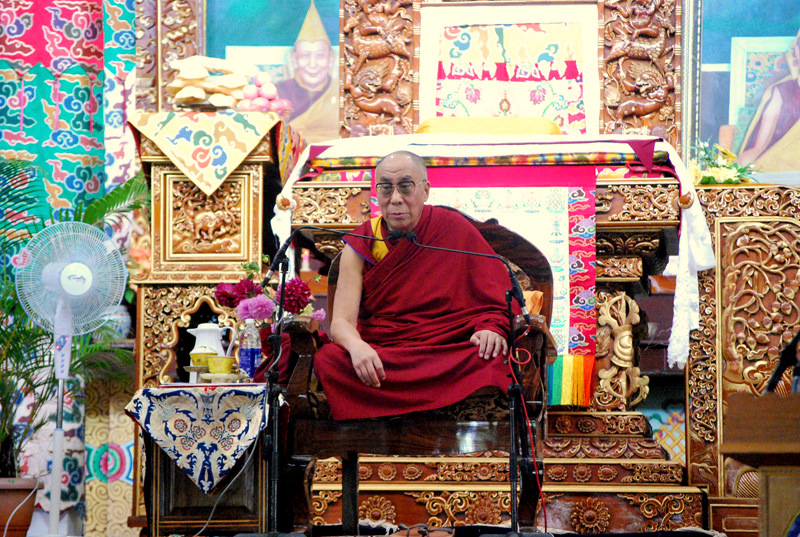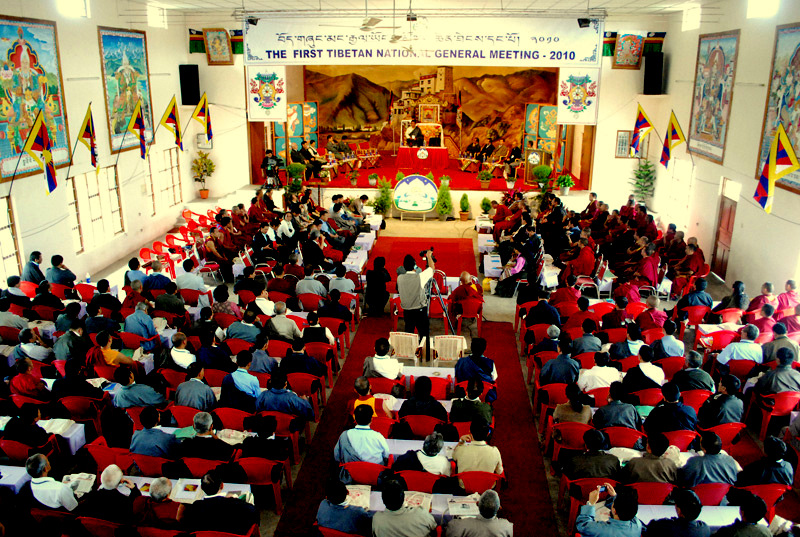 Bylakuppe: His Holiness the Dalai lama yesterday (August 31) addressed 250 delegates at the first Tibetan National General Meeting, underlining the need for unity and a robust democratic administration-in-exile to keep alive the hopes and aspirations of Tibetans living inside Tibet.
Bylakuppe: His Holiness the Dalai lama yesterday (August 31) addressed 250 delegates at the first Tibetan National General Meeting, underlining the need for unity and a robust democratic administration-in-exile to keep alive the hopes and aspirations of Tibetans living inside Tibet.
Speaking at the closing of the six-day meeting at Sera monastery, Bylakuppe, south India, His Holiness said unity must be developed between the administration and the public, through trust and transparency. He expressed his appreciation of the meeting and called for more events of this kind.
Mr Penpa Tsering, speaker of the Tibetan Parliament-in-exile, said, "The participants of the GM unanimously appeal to Your Holiness to remain as the spiritual and temporal leader of the Tibetan people and not to state retirement from leading the Tibetan people, while we reaffirm our absolute faith and allegiance to you as the supreme leader of the Tibetan people and movement."
Responding to the appeal, His Holiness said the democratically elected leadership of Tibetans-in-exile must be able to take full responsibility in leading the Tibetan quest in his absence. "I am 76 now," he said. "The responsibility should be taken over in a spirit as if I am no longer present. I will continue working for Tibet till I die, but in a different capacity which I will be good and most efficient at."
His Holiness also mentioned his "inevitable" absence in due course and that he is already in semi-retirement. "One day, I will retire from all present responsibilities in the exile government. In our Tibetan democracy, it is not a necessity that I should be present," he said, adding humorously that he too was entitled to human rights.
In a comment suggesting the gradual transfer of all his responsibilities and power, His Holiness told the meeting that the Kalon Tripa (Tibetan prime minister) has already made several final decisions on important matters during their discussions. He also ventured that important documents of the exile government should require the Kalon Tripa's signature.
However, Kalon Tripa Tsering Phuntsok also appealed on behalf of the Tibetan people for His Holiness the Dalai Lama not to abdicate from leadership, and to decide the course of action on Tibet in accordance with the changing political situation in China and the world at large.
Speaking on efforts to resolve the Tibet issue via a middle-way approach, His Holiness said the policy is strongly supported by the international community, including the US government, European Parliament and the government of India. "With a strong commitment to a mutually beneficial solution for both China and Tibet, I feel very confident to express our approach when meeting with the Chinese people," he said.
His Holiness pointed out the grave dangers currently posed to Tibetan identity, culture, environment and religion, saying this is a "critical moment". He also spoke about the need for progress in education, the preservation of Tibetan culture and the maintenance of the moral behaviour of the Tibetan people.
 Mr Penpa Tsering, speaker, read out a 32-page final recommendation to strengthen democracy and develop settlements, finance, education, health care, awareness of political affairs and the publicisation of the Tibetan cause. 90% of the resolutions were passed unanimously and 10% by majority.
Mr Penpa Tsering, speaker, read out a 32-page final recommendation to strengthen democracy and develop settlements, finance, education, health care, awareness of political affairs and the publicisation of the Tibetan cause. 90% of the resolutions were passed unanimously and 10% by majority.
The sub-committee on Sustenance of Tibetan Settlements recommended the establishment of a field research office to investigate the decline in the three primary means of livelihood in Tibetan settlements - agriculture, vocational jobs and handicrafts.
Meanwhile, the sub-group on Status of Tibetans Living in Foreign Lands Other than India, Nepal and Bhutan, called upon the education department to address the deterioration of Tibetan values among exiled Tibetans, as well as the lack of cultural understanding, especially among the younger generation in the West.
The speaker said the Kashag (central government) and the Tibetan Parliament-in-Exile will do its utmost to implement the meeting's recommendations, even though they have yet to become law, and called for the cooperation of intellectuals, non-government organisations and the community in doing so.
A traditional long-life prayer offering to His Holiness the Dalai Lama was later held at Sera monastery.
Tomorrow (September 2) there will be a ceremony to commemorate the 50th anniversary of the establishment of Tibetan democracy, during which the Tibetan Parliament-in-exile will honour His Holiness with a golden seal.
Over 30 parliament members from 14 different countries, together with legislators and dignitaries from the south Indian state of Karnataka are expected to attend.


![Tibet has a rich history as a sovereign nation until the 1950s when it was invaded by China. [Photo: File]](/images/stories/Pics-2024/March/Tibet-Nation-1940s.jpg#joomlaImage://local-images/stories/Pics-2024/March/Tibet-Nation-1940s.jpg?width=1489&height=878)















